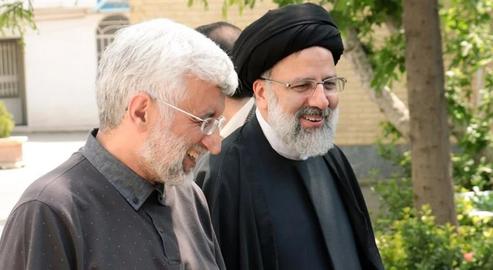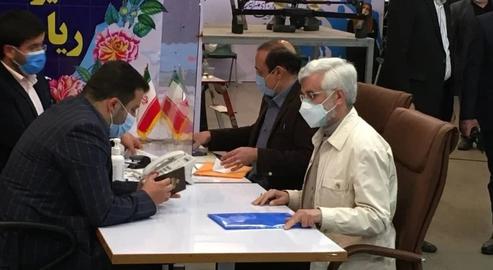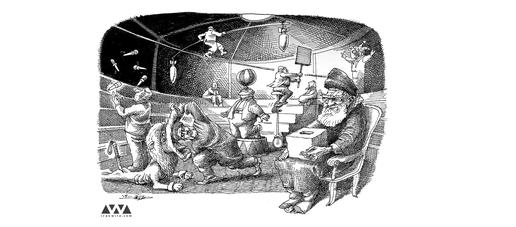Saeed Jalili, a former secretary of the Supreme National Security Council and Iran’s first chief nuclear negotiator under Ahmadinejad, registered as a presidential candidate on May 15 together with Alireza Zakani, former MP and ex-president of the Parliamentary Research Center. Hours later, Jalili came under fire for being chief justice Ebrahim Raeesi’s so-called “mouthpiece” in attacking the nuclear deal.
In an earlier “exclusive” report published May 13, Tasnim News Agency, which is affiliated with the Revolutionary Guards, had declared in that Jalili was not planning to stand. “Considering the candidacy of Ebrahim Raeesi,” Tasnim wrote, “he [Jalili] saw no reason to run.” And yet, hours after Raeesi registered, Jalili did the same.
Eight Years in the Shadows
Jalili previously stood in the 2013 presidential race and came third after Hassan Rouhani and Mohammad Bagher Ghalibaf, then-mayor of Tehran. This time, he said, he was standing because was that “he wanted to achieve things that he had planned in 2013 and 2017 but could not.”
Since 2013 Jalili has played no significant role in Iranian politics. But he kept himself in the public eye through a series of calculated publicity stunts; in 2017, for instance, he rode on the back seat of a motorcycle driven by ex-Guards commander Saeed Ghasemi to visit Sarpol Zahab, a city in the western province of Kermanshah that had been badly hit by an earthquake.
Jalili’s supporters include a specific group of young principalists known as the “Seekers of Justice”. Most of his campaign slogans resemble those of conservative frontrunner Raeesi and are modelled on former talking points used by Ahmadinejad.
Jalili, however, has never enjoyed the full support of Iran’s principalists. Even in 2013, the Front of Islamic Revolution Stability, which had appeared to be close to him, chose Kamran Bagheri Lankarani, Ahmadinejad’s former health minister, as its preferred candidate before the latter was knocked out of the race by the Guardian Council. Jalili also enjoys no support among Iran’s traditional hardline camp, who tend to support Ebrahim Raeesi.
As such, some speculate Jalili only entered the race to support Raeesi in pre-election debates after Ali Larijani, former speaker of the parliament, registered as a potential rival candidate. He might also be standing in order to publicly challenge any return to the terms of the JCPOA as talks continue in Vienna.
Supporters of the Rouhani administration believe any US return to the deal before June 2021 would benefit any candidates it throws its weight behind. The fallout from Foreign Minister Mohammad Javad Zarif’s leaked interview and fact that Zarif has not entered the race himself indicates the issues it covered, including the JCPOA, weigh heavy on the expected outcome of the vote.
By means of a counterpoint, some have called on Ali Akbar Salehi, former foreign minister and the current head of Iran’s Atomic Energy Organization, to stand so that someone can promote the JCPOA during presidential debates. Jalali, like Ahmadinejad himself, is said to have opposed the secret negotiations with the US in Oman between 2012 and 2015, while Salehi was the foreign minister.
Diplomacy is Not “Delivering Sermons”
During debates ahead of the vote in 2013, Jalili, like Ahmadinejad, took a highly aggressive stance but was ultimately trumped by Ali Akbar Velayati, senior adviser to the Supreme Leader in international affairs. In one debate, Velayati said pointedly that diplomacy was not about “delivering sermons” or taking a “philosophy class” and questioned Jalili’s actions as chief nuclear negotiator from 2007 to 2013.
Velayati’s quip may have been linked to anecdotes Western diplomats have related about Jalili. Direct negotiations with the US started with Jalili as Iran’s chief negotiator, but he was never able to gain any ground.
William Burns, the former senior American negotiator, writes of their discussions in 2008 in his book The Back Channel: A Memoir of American Diplomacy and the Case for Its Renewal: “Jalili embarked on nearly forty minutes of meandering philosophizing about Iran’s culture and history, and the constructive role it could play in the region. Jalili wound up his comments by handing over an Iranian ‘non-paper’ [an unofficial diplomatic agreement].
“The English version was mistakenly headed ‘None Paper’, which turned out to be an apt description of its substance. [EU foreign policy chief Javier] Solana and the rest of us looked at it quickly, at which point my French colleague helpfully groaned and muttered, ‘Bullshit’, which caused Jalili to look somewhat startled — and me to lose my game face.”
Jalili’s academic background is also of a more scholarly than pragmatic nature. As a graduate of Imam Sadegh University, which ostensibly trains personnel for the Islamic Republic, his thesis was entitled “Foundations of Islamic Political Thought in the Quran”.
There seems a good chance that Jalili will withdraw ahead of time because of the crushing presence of Raeesi. Nevertheless, he does enjoy support from some unexpected quarters. In the 2013 election Jalili received around four million votes. Ahmad Alamolhoda, Mashhad’s Friday Imam, later said that in a meeting between the Supreme Leader and Jalili after the vote, Khamenei told Jalili that his four million were the “the essence of the revolution”. The leader reportedly added: “See how you can connect together these four million people who voted for you as a symbol of the resistance...We pray that Saeed Jalili remains in the arena.”
In the 2013 election, in Polling Place 110 where members of Khamenei’s staff cast their votes, Jalili received 200 votes and Mohammad Bagher Ghalibaf 124. It could very well be that Jalili is still a favorite of Khamenei and his staff. But despite this, they will still prioritize backing the winning horse – whether that be Jalili or a more likely candidate.
Related Coverage:
Ebrahim Raeesi’s Presidential Candidacy: A Gamble on Succeeding Khamenei
IranWire Exclusive: Chief Justice Using Fabricated Supporters in Presidential Bid
Chasing the Centrist Dream: Ali Larijani Registers for Presidential Race
The Return of Ahmadinejad: What is Iran's Populist Demagogue Trying to Prove?
General Signs Up in Revolutionary Guards' Battle for the Presidency
Has the Regime Decided Low Election Turnout is its New Strategy?
visit the accountability section
In this section of Iran Wire, you can contact the officials and launch your campaign for various problems


























comments